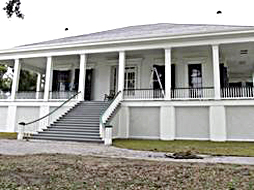|
Descendant says Jefferson Davis is one
of history’s most misunderstood figures
According to one of his descendants, Kentucky’s Jefferson Davis is “one of the most misunderstood figures in this country’s history.”
Bert Hayes-Davis, the great-great grandson of the only president of the Confederacy, is among the descendants of the Fairview-born luminary who gather every two years at Rosemont Plantation near Woodville, Miss., to celebrate the ancestor they consider an American hero.
Hayes-Davis points out that his great-great grandfather was a West Point graduate, a war hero, U.S. congressman, senator and Cabinet member. And, “an American patriot.”
As a U.S. senator, Davis was a key proponent o The Smithsonian Institute's creation. As secretary of War under President Franklin Pierce, he helped design the National Capitol and the Statue of Freedom atop its dome.
“No one knows that,” Hayes-Davis said. “Those are the things we want people to realize.”
To most people, Davis’ life boils down to one day: Nov. 6, 1861 – the day he was elected president of the Confederate States of America.
“That’s what bothers me the most,” Hayes-Davis said. “We lost the first 51 years of his life.”
The ability to tell Davis’ story was dealt a major blow when Hurricane Katrina crashed ashore on the Mississippi Gulf Coast Aug. 29, 2005. Beauvoir, the stately Greek Revival beach-side home where Davis spent the last 12 years of his life, was severely damaged and nearly a third of the museum’s artifacts were lost or destroyed.
“We moved as many small items as we could before the storm came,” Rick Forte, chairman of the Beauvoir board and acting director of the historic home, said.
Many manuscripts and books and larger display items such as Davis’ military uniform from the Mexican-American War, desks from his offices in Washington and his two carriages, perished in the storm.
“You just can’t replace any of that,” Hayes-Davis said.
The day after Katrina, Hayes-Davis, who had been going to Beauvoir all his life, received a call. He doesn't remember who it was, but the message was clear: “It’s all gone.”
“I was just devastated,” he said. “I think I probably broke down and started crying.”
A few days later, he looked at a Google satellite image of the Gulf Coast and saw that amid the damage, two structures were still there – the main house and the presidential library.
“I just could not withhold my amazement that it was still there,” he said.
In front of Beauvoir, a massive bronze statue of Davis stood defiantly.
“I realized at that point that we had an opportunity,” Hayes-Davis said.
Since the storm, Beauvoir has been substantially rehabbed – thanks in part to federal disaster recovery funds.
“We still have a long way to go,” Forte said. “The ideal is to put it back like it looked when Jefferson Davis lived there.”
Both Forte and Hayes-Davis say they believe Davis would have continued to serve the United States if he had not been named president of the Confederacy.
“If the war hadn’t happened when it did, there was a good chance of him becoming president of the United States,” Forte said. “That's how well-known he was at the time.”
Hayes-Davis believes his relative is the victim of a historical mischaracterization and he’s particularly bothered by those who try to dismiss him as a racist.
“He wasn’t the inventor of the institution of slavery,” he said. “He didn’t even want the job, but Jefferson Davis was never one to turn down the request to serve.”
He said Davis’ loyalty to the Confederacy has to be viewed in context.
“You can’t judge yesterday’s issues using today’s standards,” he said. “(Slavery) was the standard of the day – it’s the way the world was.”
|














